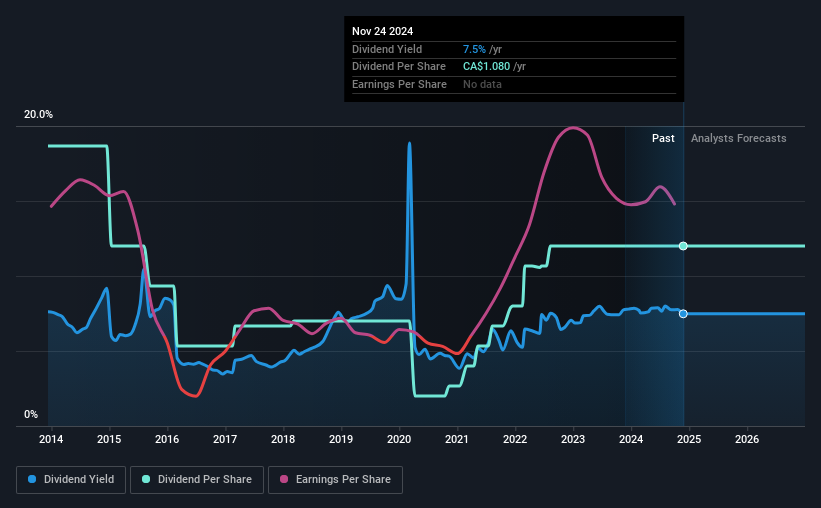- Canada
- /
- Oil and Gas
- /
- TSX:FRU
We Wouldn't Be Too Quick To Buy Freehold Royalties Ltd. (TSE:FRU) Before It Goes Ex-Dividend

It looks like Freehold Royalties Ltd. (TSE:FRU) is about to go ex-dividend in the next 4 days. Typically, the ex-dividend date is one business day before the record date which is the date on which a company determines the shareholders eligible to receive a dividend. It is important to be aware of the ex-dividend date because any trade on the stock needs to have been settled on or before the record date. Therefore, if you purchase Freehold Royalties' shares on or after the 29th of November, you won't be eligible to receive the dividend, when it is paid on the 16th of December.
The company's upcoming dividend is CA$0.09 a share, following on from the last 12 months, when the company distributed a total of CA$1.08 per share to shareholders. Looking at the last 12 months of distributions, Freehold Royalties has a trailing yield of approximately 7.5% on its current stock price of CA$14.44. If you buy this business for its dividend, you should have an idea of whether Freehold Royalties's dividend is reliable and sustainable. As a result, readers should always check whether Freehold Royalties has been able to grow its dividends, or if the dividend might be cut.
See our latest analysis for Freehold Royalties
Dividends are typically paid from company earnings. If a company pays more in dividends than it earned in profit, then the dividend could be unsustainable. Freehold Royalties paid out 123% of profit in the past year, which we think is typically not sustainable unless there are mitigating characteristics such as unusually strong cash flow or a large cash balance. Yet cash flows are even more important than profits for assessing a dividend, so we need to see if the company generated enough cash to pay its distribution. Freehold Royalties paid out more free cash flow than it generated - 166%, to be precise - last year, which we think is concerningly high. We're curious about why the company paid out more cash than it generated last year, since this can be one of the early signs that a dividend may be unsustainable.
Cash is slightly more important than profit from a dividend perspective, but given Freehold Royalties's payments were not well covered by either earnings or cash flow, we are concerned about the sustainability of this dividend.
Click here to see the company's payout ratio, plus analyst estimates of its future dividends.

Have Earnings And Dividends Been Growing?
Businesses with strong growth prospects usually make the best dividend payers, because it's easier to grow dividends when earnings per share are improving. If business enters a downturn and the dividend is cut, the company could see its value fall precipitously. It's encouraging to see Freehold Royalties has grown its earnings rapidly, up 49% a year for the past five years. Earnings per share are increasing at a rapid rate, but the company is paying out more than we think is sustainable, based on current earnings. Generally, when a company is paying out more than it earned as dividends, it could signal either that the company is spending heavily to fund its growth, or that earnings growth is likely to slow due to lack of reinvestment.
Many investors will assess a company's dividend performance by evaluating how much the dividend payments have changed over time. Freehold Royalties has seen its dividend decline 4.3% per annum on average over the past 10 years, which is not great to see. Freehold Royalties is a rare case where dividends have been decreasing at the same time as earnings per share have been improving. It's unusual to see, and could point to unstable conditions in the core business, or more rarely an intensified focus on reinvesting profits.
The Bottom Line
From a dividend perspective, should investors buy or avoid Freehold Royalties? While it's nice to see earnings per share growing, we're curious about how Freehold Royalties intends to continue growing, or maintain the dividend in a downturn given that it's paying out such a high percentage of its earnings and cashflow. With the way things are shaping up from a dividend perspective, we'd be inclined to steer clear of Freehold Royalties.
Having said that, if you're looking at this stock without much concern for the dividend, you should still be familiar of the risks involved with Freehold Royalties. To help with this, we've discovered 2 warning signs for Freehold Royalties that you should be aware of before investing in their shares.
If you're in the market for strong dividend payers, we recommend checking our selection of top dividend stocks.
New: AI Stock Screener & Alerts
Our new AI Stock Screener scans the market every day to uncover opportunities.
• Dividend Powerhouses (3%+ Yield)
• Undervalued Small Caps with Insider Buying
• High growth Tech and AI Companies
Or build your own from over 50 metrics.
Have feedback on this article? Concerned about the content? Get in touch with us directly. Alternatively, email editorial-team (at) simplywallst.com.
This article by Simply Wall St is general in nature. We provide commentary based on historical data and analyst forecasts only using an unbiased methodology and our articles are not intended to be financial advice. It does not constitute a recommendation to buy or sell any stock, and does not take account of your objectives, or your financial situation. We aim to bring you long-term focused analysis driven by fundamental data. Note that our analysis may not factor in the latest price-sensitive company announcements or qualitative material. Simply Wall St has no position in any stocks mentioned.
About TSX:FRU
Freehold Royalties
Engages in the acquiring and managing royalty interests in the crude oil, natural gas, natural gas liquids, and potash properties in Western Canada and the United States.
Adequate balance sheet and fair value.


